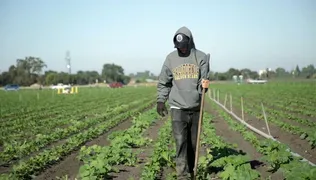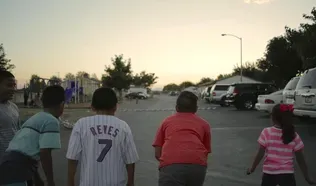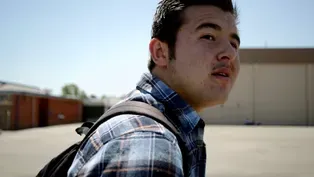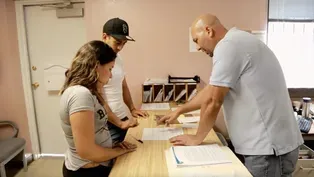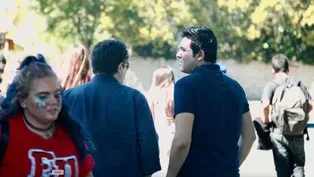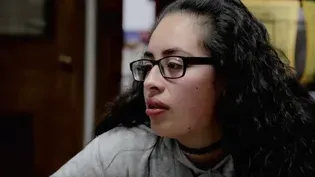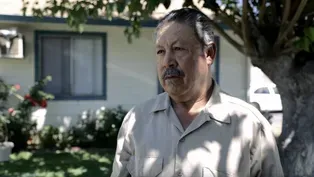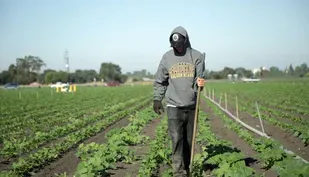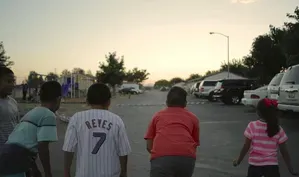
Como Vivimos (How We Live)
Season 12 Episode 6 | 1h 12m 58sVideo has Closed Captions
California farmworker housing rules force seasonal moves, upending Latinx students' education.
In California’s Central Valley, hundreds of Latinx youth miss months of school annually, because they live with their families in one of the state’s farmworker housing centers. These subsidized apartments require families to move out each winter and relocate at least 50 miles away before being allowed to return in the spring. These cycles of displacement come at a high cost to families’ futures.
Problems with Closed Captions? Closed Captioning Feedback
Problems with Closed Captions? Closed Captioning Feedback
Funding for America ReFramed provided by the Corporation for Public Broadcasting, John D. and Catherine T. MacArthur Foundation, Wyncote Foundation and Reva and David Logan Foundation.

Como Vivimos (How We Live)
Season 12 Episode 6 | 1h 12m 58sVideo has Closed Captions
In California’s Central Valley, hundreds of Latinx youth miss months of school annually, because they live with their families in one of the state’s farmworker housing centers. These subsidized apartments require families to move out each winter and relocate at least 50 miles away before being allowed to return in the spring. These cycles of displacement come at a high cost to families’ futures.
Problems with Closed Captions? Closed Captioning Feedback
How to Watch America ReFramed
America ReFramed is available to stream on pbs.org and the free PBS App, available on iPhone, Apple TV, Android TV, Android smartphones, Amazon Fire TV, Amazon Fire Tablet, Roku, Samsung Smart TV, and Vizio.
Providing Support for PBS.org
Learn Moreabout PBS online sponsorshipNATASHA DEL TORO In California's Central Valley, these farm workers live in subsidized housing.
(man speaking Spanish) NATASHA DEL TORO: But when the harvest ends, they're forced to leave.
(Pérez speaking Spanish) NATASHA DEL TORO: "Como Vivimos" on America Reframed.
♪ ♪ (radio playing indistinct music) (birds chirping) ♪ ♪ (distant gunshots) Home sweet home.
GABINO: That's why I don't like it when they say, "Oh, where were you really born?"
Texas.
Just me being born here, I'm already a citizen.
(group speaking Spanish) (children laughing) (distant gunshots) WOMAN: Como vivimos.
That's better.
That's better.
That's better.
Como vivimos.
Como vivimos.
Just like that.
(distant gunshots) ♪ ♪ -JOHN VARELA: Ready?
-AGGIE: Yep.
People probably think we're crazy.
So, what we're doing here is, we're doing a lottery for the vacant units that we have.
Every year, people that don't come back, if they don't come bac and claim their unit by May 1st, then the units go into the lottery.
That means that new people can come in and try to win a house for the year, long as they qualify.
We need these other three.
I'll get them.
So, how many we have?
16?
15, 14, 13, 12, 11, ten... Last year, we had 25 families trying to get four units.
So, this is better.
16 for six.
So, six'll get 'em, ten'll be on the waiting list.
Some people don't even have houses to live in.
They either stay with family members or things like that.
I had one family last year over there that lived in their truck.
So...
They work, and that's what they do.
I don't know how they survive, but they do.
How do you say, "drawing" or "picking" or... ELSA OCHOA: Picking?
Like, if I tell them I want to-- they're gonna have to draw or pick.
(speaking Spanish) Just take one, like, just take one.
-(speaks Spanish) -Okay.
(both speak phrase in Spanish) Sorry.
I said it over.
-(laughter, applause) -(speaks Spanish) (laughs) (laughter) JOHN: One left.
-For the waiting list, huh?
-Yeah.
And... 15.
Maria Del Carmen?
(John speaking Spanish) So, the last one is... (John speaking Spanish) (office phone ringing) (woman speaking Spanish) There's three basic requirements for someone to live in a migrant camp.
Number one is their income must come from agriculture, at least 50% of their income.
And, obviously, they have to be eligible to work in the United States.
Also, during the offseason, they have to bring proof that they've been living at least 50 miles, or further away, from this camp.
So anywhere, even Roseville, is more than 50 miles.
Los Angeles, Bakersfield, anywhere.
(stammers) A lot of families go back to Mexico.
They go back to Texas.
But they have to bring three proofs that they were more than 50 miles away.
Could be anything.
A receipt from a cell phone or light bill receipt, cable bill, uh, gas station receipt.
WOMAN: What about, um... Sí.
Uh-huh.
(man speaking Spanish in voice-over) JOHN: 180 days from May 1st is considered the migrant season.
They don't share the budget with us.
They take care of that downtown.
According to them, it puts a burden or strain on the finances to keep the residents here past the 180 days.
(air conditioner humming) (man speaking Spanish in voice-over) (man 2 speaking Spanish in voice-over) (Aggie speaking Spanish) (Spanish-language ballad playing) (priest speaking Spanish over P.A.)
(Pérez speaking Spanish in voice-over) (group singing in Spanish) (Pérez speaking Spanish in voice-over) (singing continues) ♪ ♪ (children chattering) (distant gunshots) (distant gunshots) (distant gunshots) (man speaking Spanish in voice-over) MAN: Ah... (laughs) Oh... (Aggie chuckles) (Aggie speaking Spanish) (Aggie speaking Spanish) (Spanish-language song playing on phone) (José speaking Spanish) (José singing along) AGGIE: Mm-hmm.
JOSÉ: I have never gotten a 4.0, and I'm trying to this year.
AGGIE: What's it gonna take to get a 4.0?
Me studying a lot.
-Mm-hmm.
-And stay here.
-Yeah.
-Stay here because if I leave, I'm not gonna graduate.
-Mm-hmm.
-I'm not gonna... gonna be done with credits, and that's gonna be... that's gonna be a disaster.
JESSICA MUÑOZ: I have students who leave in December.
They don't come back until, um, March, so they miss, I would say, maybe, oh, 20 credits or more credits.
So, today all I'm doing is, um, giving your classes, okay?
So we're not gonna go over your credits, just because I have too many kids -that are outside waiting, okay?
-That's all right.
JESSICA: A lot of the kids work in the camps, but they close the camps, and so, once they close, they have to leave, so they have to go with their parents.
They have to go to Mexico, migrate wherever they're going, um, pack up and leave.
And when the migrant-- or when the camps open, then they get to come back.
JESSICA: We have to fit their regular classes in addition to the classes that they are behind in.
So, you had an open period first.
-Mm-hmm.
-Econ, Chemistry and Intro to Art.
-Okay.
-Is that about right?
-Yeah.
-Okay.
Intro to Art is full.
I'm just gonna let you know, so we'll figure out what there is to what's available, okay?
-Okay.
-Squeeze that one in.
'Cause I still needed the art one.
-Oh, you did.
Shoot.
-Yeah.
Because I wanted to get is the... Ceramics, but you said it was full.
Let me check right now.
Hopefully, it's available right now.
-(computer chimes) -Ooh.
One more spot right there.
You're so lucky.
Oh, my goodness.
You got so lucky with that.
Oh, you still need Econ and Government.
Okay, so... (mutters indistinctly) (teacher speaking Spanish) AGGIE: When did they do this one?
JOSÉ: Like, in February?
March?
-TEACHER: The first week.
-The first week of school.
First week of school and I wasn't here.
I...
I didn't make one.
I was in Mexico.
AGGIE: If you made one of these, what would it say?
JOSÉ: It talks about their name, how old are they, where they come from and what do they want to do.
Yeah, I come... Well, I was born here, but I was raised in... well, here, too, but... over there in Mexico, I...
I go to Michoacán, stay there.
And...
I want to become... -a civil engineer... -(school intercom beeps) ...so that one day I could have a better future for my family.
To see the whole wall full of my friends' pictures and not mine, yeah, it's pretty bad.
(indistinct chatter) (playful shouting) (indistinct chatter) (Luis Miguel speaking Spanish in voice-over) I might try you in the 800 today.
I might today.
All right?
So, everybody, we got to do a four- to six-lap warm-up.
Ready?
Let's go.
Let's go.
(students chattering indistinctly) (Luis speaking Spanish in voice-over) COACH CUEVAS: How many did you do?
Two 800s?
-Mm-hmm -Okay.
(indistinct chatter) (Coach Cuevas speaking Spanish) (train bell clanging) AGGIE: Why do you take these specific students home?
COACH CUEVAS: 'Cause they don't have a ride home.
Their parents, they work a lot.
If it's in the farm, 14, 16 hours, and if it's in the canneries, they work at night, and so they don't have time to go pick them up.
(Luis speaking Spanish in voice-over) (Coach Cuevas speaking Spanish) (Luis speaking Spanish in voice-over) I don't want to end up in the fields.
And I think, if I go to college, that could help me.
♪ ♪ (children chattering and laughing) (children shouting playfully) (man shouting in Spanish) (children laughing) (acoustic guitar playing) (people speaking Spanish) (singing in Spanish) JOSÉ: What things get you to win more money, the school or the field work?
(Spanish singing and guitar music continues) Like, I don't want to live here in the camps for the rest of my life.
I don't mind doing it, but...
I want a better future.
I see my parents working... That's the things that make you who you are.
What-what your parents do for you.
(Spanish singing and guitar music continues) (song ends) -(applause) -(people chattering in Spanish) (chuckles) (speaking Spanish in voice-over) (Aggie speaking Spanish) AGGIE: Oh... (chuckles) (both chuckling) (laughs) (plastic bag rustling) AGGIE: Mm-hmm, mm-hmm.
-(engine starts) -(car door closes) (birds chirping) (rooster crows) (vehicle approaching) SALUD CORTEZ I don't know if you can see it, but we're right directly behind the little housing facility here.
For the families that live out here in the camps, once they're ready to go off to work, they come drop them off right then and there, and then they... they're set to go to work.
We open up as early as 5:00 in the morning and close about 4:30 or so in the afternoon, and it's that convenience for the families that they know they're being cared for very well.
♪ ♪ (playful chatter) CHAVEZ: Sometimes there's weeds, like, this big, the root, and it's hard to take off.
You have to hit it like three times with the thing to cut it.
It looks like a tree.
(woman speaking Spanish) (singing in Spanish) (playful shrieking) (ice cream truck playing "Turkey in the Straw") LUIS: English 3.
Biology.
I don't know why I failed Biology.
We're going to the migrant office, uh, to work on credits 'cause I was being lazy, failed my classes.
And now I have to catch up on credits.
LAURA AGUAYO: Cyber High is an online program that we use for students to make up credits.
It's always been a supplemental program available for students, especially migrant students, that move around a lot.
When they move out of the schools, obviously, they get behind credits, they get behind on some classes, so when they come back, they have an opportunity to make up whatever it is that they were missing when they were gone.
What about Unit 1?
I finished already.
You need to take the test.
Have you taken the test?
-I haven't done it.
-Okay, you need to do the test first before you go to the next unit, so you don't get confused with the next unit.
Yep.
Who sent me the essay?
(speaks Spanish) LAURA When Luis said that he was lazy and he didn't put that much effort, it's not that they get lazy, it's just that they get discouraged, I guess, from moving from one place to another one.
Because he's really good.
He was...
He did fail some classes, but I found they were moving from one place to another one, they were living in Stockton, they...
I mean, it's not being lazy.
KEVIN KAHLER: Still not?
Oh.
Let's try-- What if we try a different computer?
What do you think about that?
Oh, you know what?
I think it's Cyber High.
It looks like we're having some Internet issues again, so... Yeah, don't log out, okay?
LUIS: Some of my cousins, they drop out in their senior year.
Some of the girls, they did graduate and went to college.
But not... not the guys.
So I'm gonna be the first... the first man from... from my dad's family to graduate from high school.
And hope to graduate from college, too, and get a degree.
(speaking indistinctly) (children shouting playfully) JUAN (rapping): ♪ I've been feeling crazy and restless ♪ ♪ Filling with the confidence and the cigarettes ♪ ♪ We smoking all day, we smoking at night ♪ ♪ Ain't on your age, I been in the flight ♪ GABINO (singing): ♪ Green hills to float with me ♪ ♪ Snow frost to dance with me ♪ ♪ I know you want to be ♪ ♪ High as the clouds you see ♪ ♪ You sm-- ♪ Oh, I forgot.
I forgot the last part of the hook.
I don't know why.
I wrote it down, man.
You said... ♪ Forget the problems-- ♪ GABINO: No, that's the second.
That's the second one.
-No.
-Yeah, green.
'Cause the middle hook is longer.
(hip-hop instrumental playing) -All right?
-Mm-hmm.
-(music stops) ♪ People handle their pain in a different way ♪ ♪ Not everyone escapes their internal jail ♪ ♪ Desperate yells coming from hell ♪ ♪ But it's just me on top of the hill ♪ ♪ Trying to ail my illness ♪ ♪ But there's no perfect cure like Illmatic ♪ ♪ It might sound dramatic, I can't find myself... ♪ (indistinct rap lyrics continue) -(children shouting playfully) -(music fades) ♪ ♪ (reporter speaking in Spanish in voice-over) (Fidel speaking Spanish in voice-over) We don't get vacation till December.
They want to close it.
...where we gonna go?
We're not gonna be able to pay a thousand dollars rent.
(scoffs) The camps, it's a miracle.
If they will let it the whole year open, nobody would go to Mexico.
We would all stay here.
Do you want help, you guys?
-Do you want help?
-Sure.
So... -FRANCISCO: When you're ready?
-BRENDA: Or like just... "Solidarity with farmworkers."
"March 15th.
December 15th.
"Good for workers, good for growers, good for students."
"End corporate tax breaks to fund migrant centers."
"Don't balance the state budget on our backs."
"If they open on March 15th and end on December 15th..." (indistinct chatter) We are residents of the Artesi II Migrant Center at 777 West Mathews Road.
We are 96 families that work in seasonal agricultural work.
We have lived in this center for more than 20 years.
We are USA citizens and legal residents.
This center, if it closes, it affects us.
It affects our work.
After that is our education, because three months, four months out of the school, it's hard to them to catch up with the other regular students and pass grade and keep going and graduate.
It needs to be upgraded.
Before, it was not mandatory, school for the kids.
(man speaking Spanish) (man 2 speaking Spanish) (applause) Thank you.
Good afternoon.
My name's Jessica Romero, and I am a resident of Artesi II French Camp.
I am 17 years old, and I have lived here at French Camp Artesi II all my life.
During the summers of my high school year, while your children, your grandchildren, your niece, your siblings were on vacation, we were in summer school trying to catch up on credits and, after that, working in the fields.
By canceling the extensions, all the high school students, including my younger brother, would have to fail their classes.
I am calling on you to find a ways and means to keep the extensions from March 15th to December 15th.
Do your job to serve the communities of California.
Thank you.
(applause) (applause) But hopefully, everything's the same.
(Aggie speaking Spanish) I think there's two of this one.
JOHN: These rules were made at a time when they didn't value education the way they do now.
I mean, when kids in the field were working at eight, nine, ten years old, so it was okay for them to close the centers whenever they wanted.
Gracias.
JOHN My biggest concern is the kids.
I'm here regardless.
I'm gonna do my work.
They're the ones who come from wherever it is they come from, and... and we're gonna see how it affects them, so...
They're the ones that are important.
The camp is here for them, so... (teacher speaking indistinctly) JESSICA: We really did a good job.
All the community has been working hard, trying to get a lot of people information.
I don't know-- I feel like things are gonna get a little bit better at least.
You were very articulate, and you made some very strong points, and you could tell that in the reaction of the people that-that you were addressing.
This is somebody who is gonna counsel them legally -on what needs to be done.
-Mm-hmm.
And then you got-- Did you-- You wrote Ben Metcalf directly also, right?
-Yes.
-Okay.
Usually, the fact that I don't get, like, involved in too much, it's because my dad's, like, really reserved, so I grew up like that.
And then my uncles, like you were talking, they all started high school, but they dropped out 'cause they knew -they wouldn't graduate.
-Yeah.
So, I don't know, I felt like, is the same thing gonna happen?
RAUL MORA: You know, I know what it feels like, um, to have cousin or family members who, you know, feel like they don't belong and they drop out.
You're trying to constantly always change that cycle and make every student feel like they belong here, that they have a right to an education.
(playing light music) Sometimes with migrant students, they just have a lack of connectedness because they're, you know, gonna have to be moving after the end of the harvest.
(brass instruments playing) (speaking Spanish) (laughs) (car horn honks) (distant cheering) (music plays distantly) -(crowd cheering) -WOMAN: How you guys doing?
(crowd applauding) (upbeat Western music playing) ANNOUNCER: Okay, we're almost halfway there.
It's easy to double forward, double forward.
Get back in there.
Get back in there.
Now, we told you, wear that leather jacket.
(music continues) ANNOUNCER: It's over.
(crowd cheering) ♪ ♪ (distant gunshots) AGGIE: How does it feel living so close to the jail?
-Nothing.
-You don't think about it?
Nah, it's just that when I, when I go to juvie-- But, I mean, like, I'm a neighbor.
I live right here.
When I went to juvie, that's why I wasn't even, like, nervous 'cause I was right here next to it.
-But-- -How long were you in juvie?
84 hours.
-How was it?
-Awful.
Pathetic.
Everything.
The worst things.
'Cause it's boring.
All you need to do is... well, I was just praying, and then I was just working out or something to get, like, distracted, to lose attention on just being there.
If you're just right there, it's boring.
You need to play around or do something, like, something, the dumbest things you want to do, so you could, like, entertain yourself, because it's pretty boring in there.
AGGIE: What was your prayer?
Me?
Getting out and being with my mom.
With my family.
(whistling a tune) That's my brother.
(both speaking Spanish) (Aggie laughs) (music plays in reverse) (music playing) (music stops) (mariachi music playing) (group singing in Spanish) JESSICA: The story goes that when La Virgen appeared to Juan Diego, it was early in the morning, so that's what why we do the mañanitas before 6:00 in the morning.
When we celebrate las mañanitas, it's, like, basically ending the year celebrating and honoring her and thanking... thanking her for all the work we have that pays every single thing before we head back to our countries.
(music and singing continue) -(music ends) -(applause) (cheering, lively shouting) (group singing in Spanish) (woman speaking Spanish) (group shouts in Spanish) (woman speaking Spanish) (group shouts in Spanish) (woman speaking Spanish) (group shouts in Spanish) FIDEL: It's December 15th, the day we need to get out.
We clean our house and everything.
We need, we need to move the things to a storage.
We have to rent a storage.
It's $600 per year, so, which costs us a lot of money.
And then, we put in our things in the truck.
(speaking Spanish) FIDEL: That's my van right there.
It's a 2,000-mile drive.
It's two or three days, and a lot of people have a lot of accidents.
Hopefully, we don't because the Virgin Mary and God always protects us.
(man singing in Spanish) (cell phone chimes) BRANDON: Like, they tell me, when I was little, I used to sing a lot and everything.
Used to be on the bike, just singing around and everything.
I grew up here in el campo.
(speaking Spanish in voice-over) (blinds opening) (John speaking Spanish) (Pérez speaking Spanish) JOHN: Sí.
(Pérez speaking Spanish) (John speaking Spanish) (laughs) (both laugh) (camera clicking) (John speaking Spanish) JOHN: Okay.
(Pérez speaking Spanish in voice-over) (singing in Spanish) It started raining again.
It's so lonely, huh?
(man singing in Spanish) It is lonely.
This is how it is when we barely first come, like this.
AGGIE: What are you gonna miss most about-- -From here?
-Yeah.
Walking the night during the camp, doing my fire and smoking my cigarettes.
I don't miss nothing from here.
Just that.
AGGIE: Walking and doing what?
That bonfire right here.
I would always make it right there.
Look, the ashes are right there.
I put dirt on it so the manager won't see it, 'cause it's right there.
And I just cover it with dirt, because if he sees it, he's gonna be like, "Oh, that was oil" or something.
But it wasn't.
It was diesel.
-So... -Why will you miss that?
FIDEL: 'Cause everybody would come.
AGGIE: So, you'll miss people.
FIDEL: Yeah.
(John speaking Spanish in voice-over) This is the last of the paperwork.
We survived all the move-outs.
She can close this out and we're done with everybody's paperwork.
Was it last month or two, uh, months?
Remember I told you, I caught someone in A-23 sleeping?
Someone from the jail that had been released that night.
Oh, they were sleeping like... like a baby.
The jail's right around the corner, and they release people and they come walking down, and sometimes they try to come on the property and we have to kick them out.
Man.
That's good enough.
They ain't gonna get through there, I mean, so... We are done for the year.
At least with tenants, not with work.
(Spanish-language music playing over radio) ♪ ♪ JESSICA: I will be coming back in January, so I could graduate from high school.
It's my last year.
My family's gonn stay back in Mexico until March because they can't be living here for three months while the camps are closed.
MUÑOZ: Jessica Romero?
This is the first year she comes this early, so this is hard for her.
This is gonna be hard for you.
-Yeah.
-Yeah.
She always comes back -in March.
-March.
Aw... You'll be okay.
We will take care of you.
You'll be fine, okay?
Last year, I had a student who stayed from one relative to one friend to... so they're considered homeless.
So they're, so they're considered homeless.
I know it sounds like it's a bad thing, but it's not.
You get services for that.
So, um, so, I need to start asking students, especially the migrant, 'cause the camps are technically closed, so I have to start asking students, "Where are you living now?
Who are you living with?"
um, just to see if we need to classify them as homeless.
(indistinct chatter) WOMAN: Do you need to reenroll?
Tomorrow.
-You need to reenroll?
-Yes.
Where is your mom and dad?
They have to be here.
-They're not here.
-Call them up.
-Huh?
-Call them up.
-Who are you living with?
-With my uncle.
Okay.
Can he come in and do your paperwork?
He has to do your paperwork to reenroll you.
-He-he's waiting here.
-Okay.
-Outside.
-I can give it to you.
He doesn't want to come in?
Yeah, he's...
Okay, let me get it for you.
Does he have a pen with him?
No, no.
He doesn't have one.
Nice, dawg.
Nice.
And, uh, bring back the, um, proof of residency like you do every year.
The address.
Can I bring that one tomorrow, miss?
I don't think so.
Let me ask.
JOSÉ: Getting ready.
(indistinct chatter) -WOMAN: Yes.
-Thank you.
Okay.
I'll...
I'll bring it Wednesday.
Hey, you know...
There's times...
...I don't want to be like this, but, Aggie, what else do I do?
-(speaking Spanish) -MUÑOZ: Okay.
This is the first year José comes back early, and he's really... he's taking it hard.
He's really, really taking it hard.
Hey.
-Mm... -Jackson?
(both speaking Spanish) -Jackson.
-In Jackson?
No, in Triglia.
(José speaks Spanish) (singing in Spanish) ♪ ♪ ♪ ♪ (people chattering in Spanish) (phone ringing) (speaking Spanish) Artesi II.
John speaking.
ELSA: Okay?
So, I just sign it and just give them their copy.
(woman speaking indistinctly over phone) JOHN: They don't have no problem signing the regular contract lease.
It's that new form that's telling them that they're only getting 14 days after and 14 days before May 1st, so...
The state made it.
Let them come down here and face the wrath of the people.
Yeah, then he should have been down here explaining it to all these people, telling them, "We made the decision," just 'cause now I'm gonna have to explain it to every single one.
-Yeah, okay?
-Yeah.
(speaks Spanish) Oh.
JOHN: It was explained to me on why they charge the daily rate.
It always says the daily rate.
Because this place was meant to be like a hotel.
Motel, hotel.
You know how a hotel charges you daily rates?
Because this is not your place to live.
♪ ♪ (video playing indistinctly) JOHN: This is something that we are allowing you to live and every day that you're here, you're obligated to pay that.
And I didn't know that, so... (Aggie speaking Spanish) ♪ ♪ (playful chatter) ♪ ♪ -(playing guitar) -(speaking Spanish) (singing in Spanish) (music and singing continue) Right now, we had some, uh, pretty messed-up welds from the robot, so, uh, we had to change the welding cable... ...from the junction box.
It's somewhere over there.
That is electrician job.
(music and singing continue) Oh, I'm-a get, um... when I turn 18 next year, this teacher offered me, um, some school, some classes, Saturday classes at Manteca Dis... um, from Manteca Unified School District to do, to get my forklift, um, certificate.
So, I'm-a get that.
I mean, 'cause there's a lot of warehouses here, and I'm barely 18, and to get a starting job, that's good.
Later on, in future, probably there's gonna be better ones.
♪ ♪ (speaking Spanish) (woman speaking Spanish) ♪ ♪ ♪ ♪
Como Vivimos (How We Live) | Migrant Education
Video has Closed Captions
Students, whose parents are migrant farm workers, know all too well the education they are missing. (57s)
Como Vivimos (How We Live) | Migrant Housing
Video has Closed Captions
To qualify for one of California's migrant housing camps, workers must follow strict rules. (58s)
Como Vivimos (How We Live) | Migrant Mental Health
Video has Closed Captions
How do migrant students fare mentally when school is allowed only part of the academic year? (57s)
Como Vivimos (How We Live) | Migrant Separation
Video has Closed Captions
Jessica Romero opens up about being separated from her family during her senior year of high school. (59s)
Como Vivimos (How We Live) | Migrant Work
Video has Closed Captions
The summer season means harvesting and much work for migrant workers in California. (34s)
Como Vivimos (How We Live) | Preview
Video has Closed Captions
California farmworker housing rules force seasonal moves, upending Latinx students' education. (30s)
Como Vivimos (How We Live) | Trailer
Video has Closed Captions
California farmworker housing rules force seasonal moves, upending Latinx students' education. (1m 25s)
Providing Support for PBS.org
Learn Moreabout PBS online sponsorshipFunding for America ReFramed provided by the Corporation for Public Broadcasting, John D. and Catherine T. MacArthur Foundation, Wyncote Foundation and Reva and David Logan Foundation.
